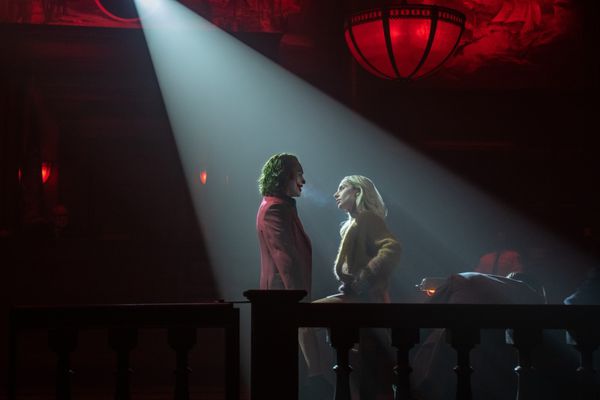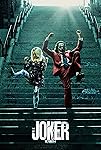Eye For Film >> Movies >> Joker: Folie À Deux (2024) Film Review
Joker: Folie À Deux
Reviewed by: Amber Wilkinson

There's no doubting the ambition from the start in this sequel to Todd Phillips' Joker - though anyone expecting Batman to be back in action should think again as this is a character study/psychodrama set within courthouse and prison walls with action set-pieces switched out for musical numbers. The musical element is something of a minor trend at the moment, with Joshua Oppenheimer’s equally ambitious, but less successful, The End, also using it to clue us into the characters’ inner thoughts in the traditional mould, even if the backdrop is considerably more grim than your average song and dance setting - think Dennis Potter rather than Andrew Lloyd Webber. Those looking for fully fledged musical numbers in a crime setting, meanwhile, should be sure to catch Emilia Perez when it arrives in cinemas, which trumps the lot.
For the record, I loved Joker, thanks largely to Joaquin Phoenix’s transformative performance - and agree with Angus’s review from the time. If the follow-up doesn’t have quite the same bleeding edge, that might be something that detractors of it, who feared it would encourage incels to commit violence - based largely on the kind of moral panic fake news that crops up occasionally around films - will prefer.

The sequel, which returns to questions of Arthur Fleck’s psyche, begins with an animated "Warner Bros" short clueing newcomers into the dual personality of this abused, bullied and pathetic loner, whose murderous alter ego surfaced in the previous film. Created by Sylvain Chomet, and more in keeping with his own Triplets Of Belleville early sound era animation style than WB, truth be told, it’s nonetheless a lovely piece of work in its own right. In it, he quickly offers a recap as the Joker's "shadow" is shown getting the better of him, ultimately killing a talk show host live on TV.
The animation is just part of the film’s major selling point, which is unpredictability. Near the start we watch the ash on Fleck’s cigarette grow long and start to think about when it will tumble off. That uncertainty is the best element of the film, which sees the performances kicking off at angles when you least expect them to.
In the gloomy gothic surroundings of Arkham Asylum, if anything, Joaquin Phoenix looks even more skeletal than previously as Fleck awaits his court date under the sadistic eye of Brendan Gleeson's When-The-Saints-Go-Marching-In-singing guard Jackie Sullivan. His lawyer Maryanne (Catherine Keener) asserts Fleck is mentally unstable rather than a cold blooded killer and Fleck, at this point, has a meekness that is pitiful and a far cry from the Joker of yore.
Soon Fleck catches the eye of Lee Quinzel (Lady Gaga), though it's his nihilistic alter ego she's interested in. She is a super-fan in the fine tradition of the likes of Misery’s Annie Wilkes’, where the fantasy of what Joker represents is far more attractive than anything as mundane as the reality that’s in front of her. There's an interesting ambiguity to Lee’s own split-personality attitude that goes mostly unexplored. Luckily, nobody puts Gaga in a corner so she makes her presence felt by sheer force of performance and star quality even if this is a dialled-down performance to dovetail with Phoenix’s.
The songs are of the old American standard or soft pop variety, including Bewitched, Bothered and Bewildered, For Once In My Life, (They Long To Be) Close to You and a cracked duet to Bee Gees To Love Somebody. When you think about it, they seem fitting choices for a man whose life essentially revolved around his mother and her narcissism. The film could use more of this musical anarchic energy, although it does find mileage in the tragedy of Fleck, which is much more prominent than in the first instalment. The excellent incidental music by Icelandic composer Hildur Gudnadottir also runs the risk of being overlooked as it slips so seamlessly in with the more familiar tunes.
It's in the moments of performance the film really comes alive. In The Band Wagon, from which one of this film’s songs, That’s Entertainment!, is plucked, Fred Astaire says: “Whether I’m the new me or the old me, remember I’m just an entertainer.” and it’s when Fleck turns on the “entertainer” that the film, and not just he, sings. That’s true not just of the musical numbers but in scenes in which he turns on the southern lawyer style in court.
What we label “entertainment” is also to a degree under the microscope, as we again see fans of Joker - who like Quinzel have had their fantasies fuelled by a true-crime TV movie - line-up to support him. Perhaps stung by the reaction to the first film, however, there’s a feeling of writers Phillips and Scott Silver fighting shy of digging too deeply at it. The unpredictability and unwieldy nature of all of this is unlikely to see everyone put on a happy face but Phillips is doing something interesting here in asking Fleck to get ready for his own sort of judgement day - and that means he’s not just doubling down on the same ideas.
Reviewed on: 04 Oct 2024

















